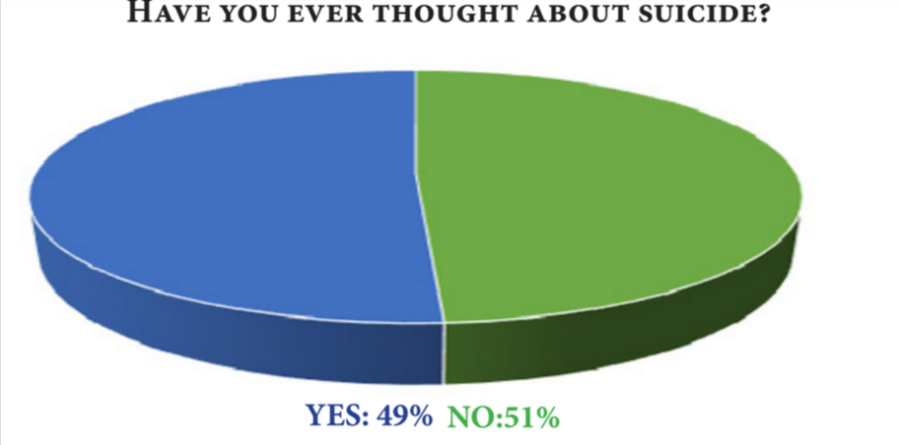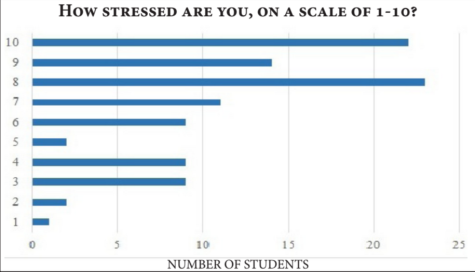DVHS students reach catastrophic stress levels
January 20, 2015
No one wants to feel like the overworked, underpaid worker. Yet according to the Tribune’s recent survey, that is exactly how many DVHS students seem to feel — except, of course, it’s worse, because we don’t get paid and have to work weekends. One look around at all the baggy-eyed, yawning students tells you that lack of sleep is an epidemic here.
Why are we all so sleep-deprived? Well, the 105 respondents to our survey answer that too: in addition to participating in several hours of extracurricular activities each week, DVHS students report spending an average of 4.7 hours a night (Monday through Thursday) on homework. Because most colleges expect applicants to be involved in clubs and community service, extracurricular activities are essentially mandatory; dropping them to get more sleep is just not an option. Despite how zombie-like, numb and callous DVHS students may have become to this issue, it is taking a real toll on their mental and physical health.
48.6 percent of those answering the survey stated they had thoughts about suicide. They revealed that 73 percent of their stress comes from schoolwork, homework and grades. The heavy burden that school places on students is a real problem that needs to be addressed.
The issue that we need to take on first in reducing this stress is the biggest— homework. How to address the issue of too much homework? Well, the easiest way to beat a problem is to understand it. As I see it, homework was a supplement probably first instituted in large scale during the earlier agricultural era of the United States. Back then, it was quite difficult for children to attend school regularly, what with the need for all hands on deck when farm work needed to be done. It only makes sense that additional assignments for students to do at home were created in order to provide a complete education for the children of that era. Today, the vast majority of children have no trouble attending school regularly, and yet, we have more homework than even our parents could have ever imagined. I propose fixing the problem by instituting two policies. The first policy is to decrease the level of weekly homework by 50 percent. The second policy is to make homework in a particular class optional for students maintaining an A in that class.
Decreasing the homework load by 50 percent means reducing the number of assignments each week so that students will spend, on average, only two nights on homework; the other two nights would be homework free. Homework–free nights would give students some breathing room, allowing them more time to study for upcoming quizzes and exams or work on assignments that are not in the nightly homework category — i.e., projects and benchmark packets.
Implicit in giving students more breathing room is another new idea: give students their finals packets at the start of the semester, so that students can see the bigger picture of where they are going in the class and can have the opportunity to start finals packets much earlier. Many a time students are given six huge finals packets one week before finals. Along with studying for finals that week before finals, most of us still have to keep up with our extracurricular commitments too. This new plan gives students the option to reduce their stress by giving them the option to start their packets sooner.
The second major policy change I proposed — to make homework in a particular class optional for students maintaining an A in that class — a bit bizarre sounding, but hear me out.
Students with A’s are doing well in the class. Naturally, they need the least amount of homework. In fact, why not entrust them with the decision of how much they should work on each subject after school? They can still hand them in, and they will be graded normally, but they do not need to hand in homework. It isn’t extra credit, but it still allows a student whose grade is starting to dip to fix his grade. Finally, not only does it decrease mandatory homework loads, it forces students with low grades to do homework that will improve their grade and their understanding of the subject.
I believe the school system does value the mental health of students. Teachers are not giving homework just to torture students. However, I think there is a widespread, institutional belief that more homework means more learning. Yet, when we are so sleep-deprived that we are on the verge of falling asleep in class every day, it is clear that this massive homework load is essentially creating the opposite effect on learning.
Also, in fairness to our teachers, we have to acknowledge the strain massive homework puts on them too. How many late nights are they spending on grading so much homework?
In summary, reducing homework and making homework optional for A students is a win-win idea that the school district should seriously consider implementing.


